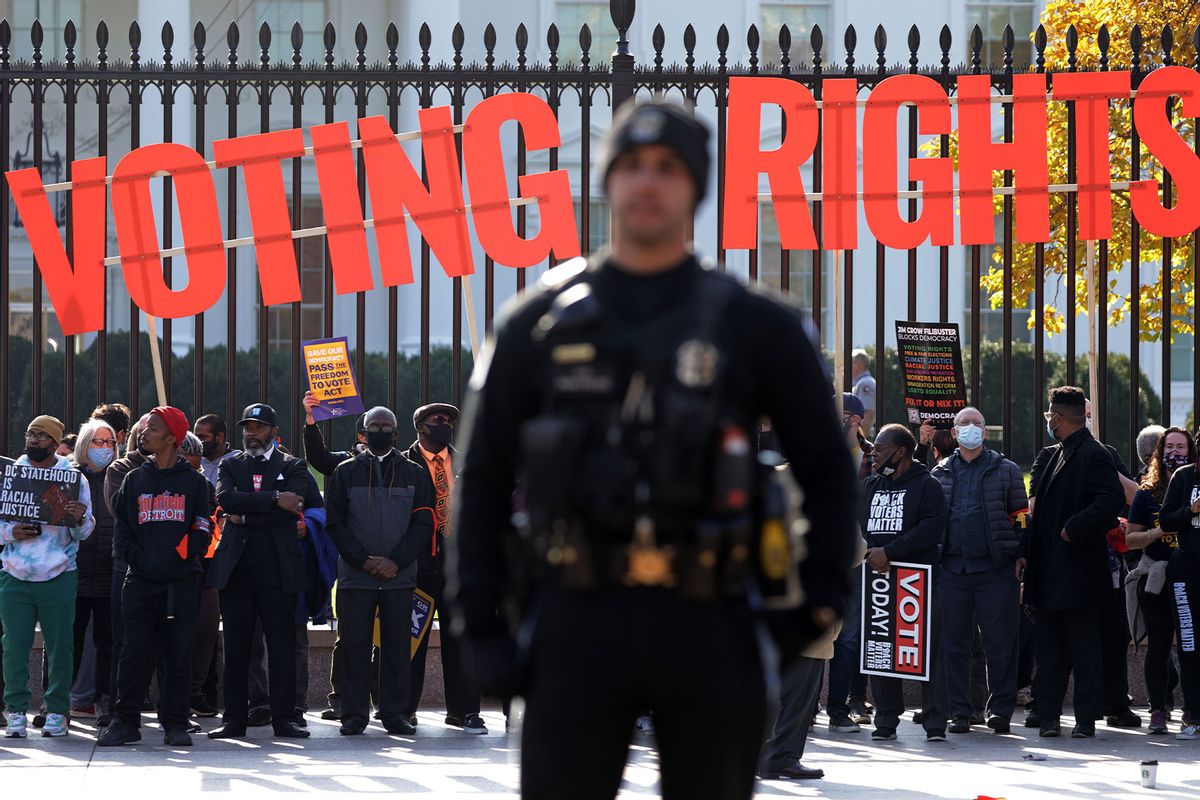A federal appeals court refused to rehear a case that would bar private groups from suing under a key section of the Voting Rights Act, which safeguards against racial discrimination in elections.
A group of Arkansas plaintiffs, who are being represented by civil rights groups, challenged a redistricting plan for the Arkansas State House of Representatives that undermines the voting power of Black voters. This case has the potential to evolve into the next legal battle at the U.S. Supreme Court.
The 8th U.S. Circuit Court of Appeals denied the request for the case to go before the full 8th U.S. Circuit Court of Appeals after a three-judge panel ruled last year that only the U.S. attorney general can enforce Section 2 of the Voting Rights Act.
The panel determined that federal law does not allow private groups and individuals, who have historically filed the majority of lawsuits under Section 2 of the Voting Rights Act for decades, to bring legal actions because the law does not explicitly mention them. Only the head of the Justice Department has the authority to initiate such lawsuits.
The 8th Circuit’s decision is “inconsistent” with the text of the Voting Rights Act, and it is “inconsistent with decades of historical practice and precedent,” James Sample, a Hofstra University constitutional law professor, told Salon. The “undermining” of Section 2 exposes the “con-game” of the Supreme Court’s 2013 decision in Shelby County v. Holder, in which the Court “falsely rationalized the undermining” of Section 5 pre-clearance by relying on the promise of the “often-inadequate backup” of after-the-fact Section 2 litigation.
The American Civil Liberties Union filed the lawsuit on behalf of the Arkansas State Conference NAACP and the Arkansas Public Policy Panel challenging a new voting map that took effect in December 2021. The plaintiffs said in their complaint that the newly drawn Arkansas House of Representatives district map diluted the strength of Black voters.
The 8th Circuit’s decision to not rehear the panel decision is a “direct threat to democracy,” Leslie Proll, senior director of the voting rights program at The Leadership Conference on Civil and Human Rights, said in a statement.
“The court is jeopardizing our freedom to vote by denying the very people harmed by racial discrimination the ability to enforce Section 2 of the Voting Rights Act, ignoring almost six decades of precedent and practice,” Proll said.
The groups are now “exploring next legal steps,” according to the ACLU.
We need your help to stay independent
The Arkansas case holds national importance concerning the Voting Rights Act, which was enacted in 1965 to combat racial discrimination in elections.
“Groups have filed lawsuits under Section 2 for decades and for decades courts have recognized that private right of action,” Mitchell Brown, a senior attorney at the Southern Coalition for Social Justice, told Salon. “Taking away the public’s ability to challenge discriminatory maps and voter suppression laws puts the foundation of our democracy at risk.”
A ruling that there is no private right of action under the VRA is “very significant,” Brown said. If the Department of Justice is not sympathetic to a voting rights issue, they have the choice to not enforce Section 2 of the VRA and that would be “devastating” to the many communities who are facing voter suppression now.
“This decision also underscores the need for substantive federal voting rights legislation that would strengthen the Voting Rights Act, to stop these undemocratic attacks on our right to vote,” he added.
Many civil rights groups are community-based and strive to embody a “community-lawyering model,” but with the inability to bring cases under the VRA, civil rights groups and communities will be forced to rely on the Department of Justice to bring those cases — and DOJ is not located in the communities we serve, Brown explained.
Want a daily wrap-up of all the news and commentary Salon has to offer? Subscribe to our morning newsletter, Crash Course.
“We’ll still be able to bring constitutional claims, but those are harder to prove in many respects because they require evidence of intent, whereas the VRA specifically refers to ‘results’ and the effect of voting statutes,” he said.
On top of this, if individuals are unable to bring claims under the VRA, then they will have to depend on DOJ, and they may not be as sympathetic to what’s happening on the ground as community groups are, Brown said.
“This decision is a significant break with prior cases and it now makes it much harder to enforce voting rights, especially going into the 2024 election where many states are making it more difficult to vote,” David Schultz, professor of political science at Hamline University, told Salon.
“This decision, along with others by the US Supreme Court weakening the VRA are going to undermine voting rights protections for people of color.”
With only the government having the ability to initiate challenges under the VRA, certain issues may not be pursued due to constraints like limited time, resources and knowledge, he added. In instances where the Justice Department and president do not support the VRA and refuse to enforce it, individuals have limited alternatives or ways to bypass their lack of support.
“Despite right-wing ideological tropes that judges should merely be umpires, conservatives on the federal judiciary, led by the Roberts’ Court majority, has aggressively re-written the Voting Rights Act to the point of rendering it unrecognizable,” Sample said. “And why? For no reason other than they don’t like it and never did.”
Read more
about the right-wing assault on voting rights
- "Terrifying": Expert outlines "endless" ways AI could "further fracture" elections and our democracy
- Legal scholar: Voting rights ruling “so extreme” that even “radical” Supreme Court may overturn it
- A quiet swing state crackdown: Could new voting laws shift the outcome in 2024?
- “They’re hypocrites”: Republicans now funding the same voting methods they demonized under Trump
- GOP waging a "coordinated national effort to undermine American elections," says leading official

Shares